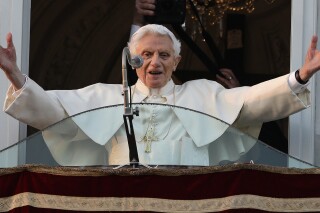Today in History: February 28, Pope Benedict XVI becomes first pope in six centuries to resign

FILE- In this Thursday, Feb. 28, 2013 file photo, Pope Benedict XVI greets the crowd from the window of the Pope’s summer residence of Castel Gandolfo, the scenic town where he will spend his first post-Vatican days and make his last public blessing as pope. (AP Photo/Andrew Medichini, File)
Today in History:
On Feb. 28, 2013, Benedict XVI became the first pope in 600 years to resign, ending an eight-year pontificate. (Benedict was succeeded the following month by Pope Francis.)
On this date:
In 1844, a 12-inch gun aboard the USS Princeton exploded as the ship was sailing on the Potomac River, killing Secretary of State Abel P. Upshur, Navy Secretary Thomas W. Gilmer and several others.
In 1849, the California gold rush began in earnest as regular steamship service started bringing gold-seekers to San Francisco.
In 1911, President William Howard Taft nominated William H. Lewis to be the first Black Assistant Attorney General of the United States.
In 1953, scientists James D. Watson and Francis H.C. Crick announced they had discovered the double-helix structure of DNA.
In 1972, President Richard M. Nixon and Chinese Premier Zhou Enlai issued the Shanghai Communique, which called for normalizing relations between their countries, at the conclusion of Nixon’s historic visit to China.
In 1975, 42 people were killed in London’s Underground when a train smashed into the end of a tunnel.
In 1993, a gun battle erupted at a religious compound near Waco, Texas, when Bureau of Alcohol, Tobacco and Firearms agents tried to arrest Branch Davidian leader David Koresh on weapons charges; four agents and six Davidians were killed as a 51-day standoff began.
In 1996, Britain’s Princess Diana agreed to divorce Prince Charles. (Their 15-year marriage officially ended in August 1996; Diana died in a car crash in Paris a year after that.)
In 2009, Paul Harvey, the news commentator and talk-radio pioneer whose staccato style made him one of the nation’s most familiar voices, died in Phoenix at age 90.
In 2012, Republican Mitt Romney won presidential primary victories in Arizona and Michigan.
In 2014, delivering a blunt warning to Moscow, President Barack Obama expressed deep concern over reported military activity inside Ukraine by Russia and warned “there will be costs” for any intervention.
In 2018, students and teachers returned under police guard to Florida’s Marjory Stoneman Douglas High School as classes resumed for the first time since a shooting that killed 17 people.
In 2020, the number of countries touched by the coronavirus climbed to nearly 60. The Dow Jones Industrial Average finished the week 12.4% lower in the market’s worst weekly performance since the 2008 financial crisis.
In 2022, Russian forces shelled Ukraine’s second-largest city, rocking a residential neighborhood, and closed in on the capital, Kyiv, in a 17-mile convoy of hundreds of tanks and other vehicles.
